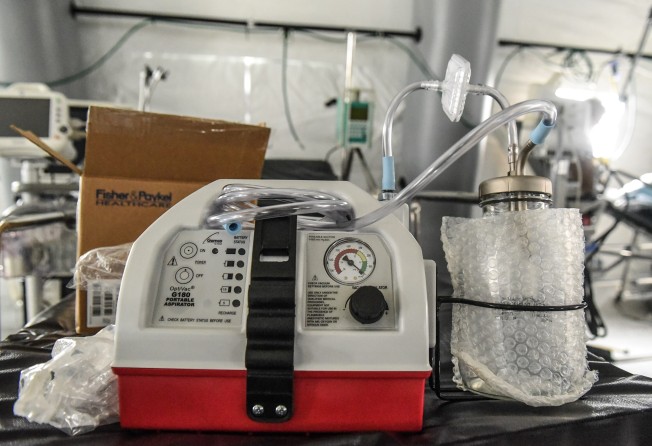Coronavirus: Japan’s bid to ramp up ventilator production at risk of being held up by red tape
- Plans for carmakers to start building the vital medical equipment appear to have been shelved amid approval processes that can take up to five months
- Japan is also trying to increase production of ECMO machines, which support heart and lung functions when coronavirus cases are in intensive care

Japanese companies are helping to ramp up the production of ventilators and other medical equipment as Covid-19 infections keep rising in the country with the world’s oldest population, but red tape could get in the way.
While Japan has 22,254 ventilators – vital medical equipment for patients hit hard by the coronavirus – Prime Minister Shinzo Abe has said he is looking to add as many as 15,000 more, including from overseas suppliers.
On Thursday, the country of 127 million reported 265 new cases, bringing its total infections to 5,200, according to broadcaster NHK. About 30 per cent of them are in the capital Tokyo, which along with six other prefectures, is under a state of emergency that has most commercial businesses except essential services closed or with employees working from home.
However, a plan to get Japan’s carmakers to produce the devices appears to have been shelved. While a Ministry of Economy, Trade and Industry spokesperson told This Week in Asia it was in discussions with the Ministry of Health, Labour and Welfare to get companies, including carmakers, to start building ventilators, it first needed approval from the health ministry.
The two-stage process for approving complex medical devices can take up to five months.
Professor Kazuhiro Tateda of Tokyo’s Toho University Omori Medical Centre, a member of the expert panel advising the government on the outbreak, said approvals usually took time “but we hope they will change that as this is a crisis”.
There have been reports of ventilators for animals being repurposed to treat human patients, but Tateda, who is also president of the Japanese Association for Infectious Diseases, believes this is unlikely to happen.
“We don’t need so many ventilators now, compared to the United States and Europe, but we do need to prepare more now,” he said.
While Abe said Toyota would help to procure up to 20,000 ventilators, a spokesperson for the country’s largest car manufacturer said it was not able to produce the machines but could use its famously efficient Toyota Production System to help companies in Japan that were doing so.
“We are supporting manufacturers, acting like a consultant, advising how to procure and route components, where and when to check for quality control to prevent problems down the line,” the spokesperson said.
Toyota has begun manufacturing face shields for use by medical personnel treating infected patients, and is aiming to produce 500 to 600 a week, the spokesperson added.
Japan is also trying to increase production of ECMO (extracorporeal membrane oxygenation) machines, which support the functions of the heart as well as the lungs and are used when severe coronavirus cases are in intensive care.
Japan’s number of hospital beds per capita is one of the highest in the world, but its number of intensive care unit beds per 100,000 people – at 7.3 – is below Italy’s 12.5, 9.7 in Spain and 34.7 in the US, three of the countries hardest hit by the pandemic.
There are upwards of 1,300 ECMO machines available in the country, according to a March survey by the Japanese Society of Respiratory Care Medicine and the Japan Association of Clinical Engineers. However, only about 300 of these machines are available for treating Covid-19, said Satoru Hashimoto, the director of intensive care medicine at the hospital of the Kyoto Prefectural University of Medicine, to The Japan Times last month.
Japan’s leading ECMO manufacturer Terumo – which has a factory in Shizuoka, about 145km southwest of Tokyo – is currently running seven days a week to meet increased demand.
“We usually manufacture about 100 ECMO systems a year, but are currently aiming to produce that number in a few months,” said Minori Matsuda, who works in corporate communications for Terumo. “Hospitals usually use an ECMO for around five years and so we’ve never seen a sudden increase in demand like this before.
“Somewhat similar to a computer or a car, an ECMO requires hundreds of components in its assembly, so we have to rely on the cooperation of numerous suppliers to keep the lines running,” said Matsuda, who added that most of the suppliers being in Japan had so far minimised disruption to the supply chain.
An ECMO system costs around 14 million yen (US$128,950), while the disposable equipment for each patient is another 300,000 yen (US$2,760), according to Matsuda.
While Japan has been criticised for its low testing rate, making it difficult to assess how prevalent infections are, Abe said he was considering introducing roadside testing to double the country’s testing capacity to 20,000 samples a day.
Additional reporting by Bloomberg and Kyodo